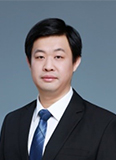

Speaker

Assoc.Prof. Guan Bin
Shanghai Jiao Tong University
管斌副教授,大连交通大学
中国内燃机学会后处理技术分会,委员兼副秘书长
Research Area:
1. Emission control of combustion pollutants
2. Non-thermal plasma technology
3. Synthesis of High Efficiency Nanocomposite Functional Materials
4. Advanced Energy Materials Design, Regulation, Applications, and Nanocatalysis
5. Energy Catalysis and Environmental Catalysis
6. First Principles Density Functional Theory (DFT) Quantum Mechanics and Molecular Dynamics Simulations
Title: Catalytic combustion of lean methane assisted by electric field over Pd/Co3O4 catalysts at low temperature
Abstarct:
A series of Pd/Co3O4 catalysts were prepared by Self-Propagating High-Temperature Synthesis method (SHS) in this study, and electric field was applied for catalytic combustion of lean methane over Pd/Co3O4 catalysts at low temperature. When electric field was applied, the catalytic combustion performance of CH4 was greatly improved, and the application of electric field could reduce the load of active element Pd to some extent while maintaining the same efficiency. Based on experimental tests and the analysis results of XRD, XPS, H2-TPR and in-situ DRIFTS, the mechanism of catalytic oxidation of CH4 over Pd/Co3O4 catalysts in electric field was proposed. The catalytic combustion of CH4 only occurs when the temperature is not lower than 250℃ normally, but when electric field were applied, the whole oxidation process of CH4 was promoted significantly, and the reaction temperature was decreased significantly. Electric field could promote the reduction of the support Co3O4 to release the lattice oxygen, resulting in the increasing of PdOx and the surface chemisorbed oxygen which could provide more active site for the low-temperature oxidation of CH4. Furthermore, the electric field could accelerate the dehydroxylation of CoOOH to further enhance the activity of the catalysts.
————————————————————————————————————————————————————————————————————————————

Assoc.Prof. Junhui Zhao
University of New Haven, Department of Electrical and Computer Engineering & Computer Science
赵俊晖副教授,纽黑文大学电气与计算机工程及计算机科学系
Research Area:
Control and management of distributed generation sources and energy storage in smart grids
Cybersecurity study for smart grids
Voltage stability of power systems
Title: Optimal Operation and Management for an Electric Taxi Battery Swapping Station
Abstarct:
Recently, with the development of charging facilities and the advancement of electric vehicle technology, there is an urgent need to improve the management of charging stations for electric vehicles (EVs). Battery swapping stations (BSS) as a medium between power systems and EV users have attracted the attention of scholars due to their fast charging method. In recent years, a variety of cities has constructed the demonstration BSSs project for the electric taxi.
In this study, we work on the optimal operation and management for an electric taxi BSS. First, we used the data mining technique to study the pattern and behavior of taxi operations. The mining results were used to get the demand for batteries in the BSS with two operation patterns, daytime-only operation and 24-hour operation. By taking the income and expenditure of the BSS into consideration, a genetic algorithm is used to find the optimal battery capacity of the BSS in two constraints. Then an optimal model is proposed considering the revenue and expenditure of the BSS in a battery life cycle. In the end, we studied the impact of incorporating photovoltaic (PV) generation into the BSS operation.
————————————————————————————————————————————————————————————————————————————

Assoc.Prof. Kong Depeng
China University of Petroleum (East China)
孔得朋副教授,中国石油大学(华东)
Research Area:
Lithium battery thermal safety, fire dynamics and risk assessment in oil and gas industry
Title: Thermal runaway mechanism and prevention technology for lithium-ion battery under external overheating
Abstarct:
The proliferating thermal runaway (TR) accidents are still the main obstacle that hinders the extensive applications of lithium-ion batteries, and an abuse condition triggering TR of particular interest is external overheating. Aiming at obtaining critical parameters of TR and studying the fire and deflagration behavior, the LiNiCoAlO2 18650 cells are over-heated under different incident heat fluxes. Combined with the TR mechanism from experimental investigation, a three-dimensional model was developed within OpenFOAM to study the effects of various battery materials, external heating conditions and heat dissipation conditions on battery TR behavior. Then a numerical model, which can capture the cell temperature and internal pressure evolution, venting and subsequent combustion of 18650 lithium-ion batteries under thermal abuse, was developed by coupling conjugate heat transfer with computational fluid dynamics. Finally, the prevention technology in using of thermal management system of PCM-fin structure and PCM-liquid cooling was proposed to help prevent the thermal runaway of lithium-ion battery from overheating.
————————————————————————————————————————————————————————————————————————————

Prof. Ting Yang
School of Electrical and Information Engineering, Tianjin University, China
杨挺教授,天津大学电气与信息工程学院
Research Area:
Energy & Power, Internet of Things, Artificial Intelligence, Intelligent Manufacturing
Research Experience:
Prof. Ting Yang, doctoral supervisor, is a discipline leader in the School of Electrical and Information Engineering, Tianjin University. He is the deputy director of the national "distributed energy and micro grid" international science and technology cooperation base and the deputy director of Tianjin "Energy Internet” International Joint Research Center. As the largest contributor, he has won two provincial and departmental science and technology progress awards and some enterprise science and technology progress awards. He has published more than 100 SCI/EI papers, 4 monographs and 2 international invention patents in top academic journals in China and abroad. He has served as the session chair of several IEEE international conferences. He also served as the editor in chief or member of the Editorial Committee of several SCI journals. He is the special editor in chief of "Application of artificial intelligence in power system and energy Internet"(which won him the "Outstanding Special Editor Award" in 2018) of “Journal of Power System Automation”, and the special editor in chief of "Ubiquitous Power Internet of Things (UPIOT)" of “Journal of Power Construction”. He is now the deputy director of circuit and system branch of China Electronics Society, the national director of sensor sub committee of China Instrumentation Society and a member of the theoretical electrician special committee of China Electrical Engineering Society. His main research interests include energy & power, Internet of things, artificial intelligence and intelligent manufacturing.
